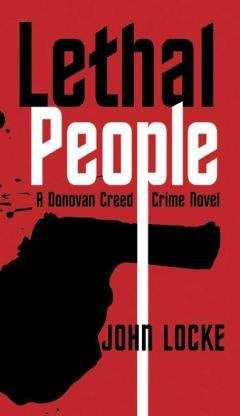John Locke - Lethal Experiment
She kissed the air on her end of the line and giggled when I didn’t kiss her back.
“What,” I said.
“You always try to act so tough. It’s adorable.”
I couldn’t wait to tell Quinn how adorable I was.
After we hung up I sat in my chair by the gate that would have taken me to Nashville. Now I’d have to go all the way back to the main terminal, cancel the Nashville flight, and book the twelve-fifteen to New York City—which boards from the gate directly opposite the Nashville gate. On the bright side, I didn’t have to get any suitcases off the plane. The phony jewelry suitcase I’d booked on the trip down had long since been discarded.
I took a deep, cleansing breath and closed my eyes. When I opened them I saw a well-dressed guy, late-forties, checking into first class astride a stunning, long-legged beauty, roughly half his age. She was toned and tanned and ponytailed, with shiny pink lipstick and perfect white teeth, and that effusive, self-confident-yet-naïve, perky quality that reminds every guy of the cheerleader from high school he loved from afar but could never approach.
In other words, she looked like half the hookers I’d taken on similar trips.
All of us in the waiting area stared at her like a kid trying to find Waldo in a picture book. Speaking only for myself, if Waldo had been hidden anywhere near her denim miniskirt or the pale pink panties we’d gotten a glimpse of, I’d have found him twenty times. I felt a tug of desire and realized I’d just gotten the phone call—the one that would either save my life, or destroy it. I might have been sitting at a gate in an airport at the time, but I was literally at a crossroads. Nashville loomed to the left, representing the status quo, my comfort zone, and the known.
The door to Nashville offered a future filled with hookers and free time, travel, excitement, bullets and danger.
The door to my right led to New York and Kathleen, who seemed to be moving me at breakneck speed toward monogamy, fatherhood, and the wedding altar. If I took that door, in three years the sex faucet will have slowed to a drip and the arguments will take longer to quell. Routine things would start annoying us about each other, and resentments would build. Addie would steadily crowbar her way into our hearts and lives and it was only a matter of time before we’d lose the “us” that brought us together in the first place. There would be endless hours of babysitting, homework, tears, adolescent issues, sleepovers. There would be obligations to church, school, friends and sports, and all spontaneity would vanish from our lives.
I glanced at the gate to New York City and saw a future unfolding before me that made me question my commitment to Kathleen and Addie. Would I have to give up my job and don a suit and tie and work for some corporate schmuck? Would Kathleen expect me to get involved in her charity work? Could I ever see myself playing tennis or golf at some tight-assed country club or hosting mind-numbing cookouts for the neighbors, having to deal in a civilized way with the guy that drools over my wife’s ass and comes on to her every time I’m looking the other way?
I looked at the babe, cooing in the middle-aged guy’s ear. He said something and she giggled and gave his earlobe a gentle bite with those perfect, porcelain teeth. Both of them seemed completely oblivious to the glares and stares of the disgusted women and envious men watching their public show of affection. As they headed through the jet way, he cupped her ass in his hand. Did she scold him or call him a pervert? No. She rewarded him with a squeal of delight.
It’s not too late, I thought. I can still be that guy.
Chapter 36
In the end, it wasn’t such a hard decision. While it was clear Kathleen was leading me to the altar, she wasn’t forcing me to take the plunge immediately. She’d let me enter the water an inch at a time. I knew what it was like to take a hooker to Nashville, but I didn’t know what it was like to live with Kathleen and Addie. And I wanted to find out.
Hours later, in New York, I waited in Kathleen’s duplex until I heard the taxi door slam shut. I raced outside like any other suburban goober and hugged Kathleen and Addie like the lifelines they were.
Addie said, “Me and Kathleen are BFF’s!”
“Wow, BFF’s!” I had no idea what that was, and Kathleen knew it.
She smiled and whispered, “Best friends forever.”
I whispered back, “I knew that.”
“Of course you did!”
I paid the cabbie, picked up Addie’s suitcases, but paused at the front door landing when Kathleen said, “Wait. Let’s take a moment to appreciate this. When we enter that door, our lives are going to change forever.”
She beamed with happiness, and Addie smiled back at her. This little burn victim had lost her parents, her twin sister, and all her possessions in a ghastly fire six months ago, but you’d never know it today. I might test torture weapons for the military, but my strength and endurance is nothing compared to Addie’s. Beyond her strength of will, she had a plucky optimism that was as inspiring as it was contagious. Addie was part Little Orphan Annie and part Superman.
They passed through the doorway and Addie squealed with delight and clapped her hands when she saw the cookies I’d baked and set out for them on the kitchen table. I could only imagine how excited they’d be to see the gifts I’d bought: a large wicker picnic basket and a blue checkerboard quilt. I wondered if we would someday remember these as the first things bought for our new family.
I lingered the slightest bit on the landing before joining them, giving extra weight to what Kathleen had said. She was right, of course. After today, my life would never be the same.
And that was a good thing.
Two hours later, celebration dinner.
I don’t know any restaurants in New York City that are the exclusive domain of little girls, but Serendipity 3 comes close. With its giant clock, colorful Tiffany-style lamps, white tea party tables and chairs, the interior made me feel as though we’d fallen into a movie set of Alice in Wonderland. It wasn’t all about the décor. I’d been told the deserts, especially the frozen hot chocolate—was to die for. Addie raced around the little restaurant store while Kathleen and I waited for a table. When we were seated, Kathleen looked at me and burst into laughter.
I raised my eyebrows. “What?”
“You sitting here,” she said.
“Uh huh.”
She laughed again. “It’s so, I don’t know…”
“Incongruous?”
She looked at me and mouthed the word and made a funny face to express her disbelief.
“Okay,” she said, “that settles it. You’re the homework parent.”
I nodded.
She cocked her head and peered at me curiously.
“What now?” I said.
She reached her hand across the table and took mine. “I love you, Donovan,” she said, “and I’m looking forward to our first picnic together.”
“You want to have one tomorrow?”
“I want to have one in six weeks.”
“Why six weeks?”
“That’s when Addie will be able to stay outside more than a few minutes at a time.”
“Cool. Six weeks then.”
“It’s a date,” Kathleen said.
Addie ran back to the table, took a seat, and told us about the treasures she’d discovered. Like a perfect BFF, Kathleen was enthralled listening to her, matching her new daughter’s level of animation and enthusiasm. No doubt about it, Kathleen was going to be a great mom.
While they chatted, I couldn’t help but notice the curious stares from the other kids in the restaurant as they took in Addie’s horrific deformities. The house fi re that killed her family had done a number on her face, neck and arms. But I was pleased to see that no one was pointing at or making fun of her.
I didn’t envy what this plucky kid would have to go through in the years to come, though I’m sure she was depending on me to be there to help. Would I be part of her life? Part of her family?
At that moment, I believed I would.
Chapter 37
The four days and three nights I spent in New York City with Kathleen and Addie could not have been better. We hit the aquarium, the planetarium, and several museums, and Addie settled easily into her new life with Kathleen. Our evenings were spent on the internet. Addie loved virtually touring houses for sale near Bedford, Virginia, and we found several that we planned to visit as soon as my schedule permitted.
One happy surprise for me: Kathleen appeared totally content with our relationship such as it was, and never once mentioned or even alluded to marriage. It must have been obvious to her that I cherished my time with the two of them, but it was probably just as obvious that I wasn’t ready for full-time duty yet. I tried not to show it, but by the fourth morning together in that cramped little house I was starting to climb the walls.
I hadn’t entirely ignored my work, I’d made some calls. Quinn was still with Alison. She’d finished her work in Dallas and the two of them were heading to Phoenix, where she’d be conducting next week’s audit. She hadn’t heard from Afaya yet, but Darwin was certain she would, and soon.
Speaking of Darwin, he called to tell me that the new head of the Texas Syndicate was a slime ball named Darryl Hobbs. Darwin was putting together a profile on him, but because Hobbs would be paranoid these first weeks, we’d have to take extra precautions before arranging a sit down with him.
I’d also put together a plan for dealing with Tara Siegel, assuming I could locate her. I’d need Callie for backup, and at least one other soldier. My diminutive, power-crazed employer, Victor, claimed to have an army of little people scattered all over the country. I hesitatingly called to ask if he had any capable associates in Boston I could contact in case things got too hairy with Tara. Victor was less than enthusiastic when I explained what I had in mind, since he preferred that I go to Nashville to kill Rob and Trish. Nevertheless, he gave me the contact information for a little person named Curly.
“Watch out for Curly,” Victor said.
“Why’s that?”
“He’s a real lady’s man.”
“Uh huh.”
“You and Callie really can’t handle this woman by yourselves?”
“Tara might have soldiers of her own,” I said.
Chapter 38
The odds of finding Tara my first night in Boston were less than zero, so I decided to let her find me.
The Life after Suicide Therapy class (LAST) meets weekly at Boston’s Norton Community Center on Franklin Street, near Devonshire. I purposely walked in a few minutes late hoping to catch Tara by surprise, but she wasn’t there. It had been nearly two years since I’d been to one of these sessions, and I didn’t recognize any of the attendees. The instructor was the same, and he remembered me well enough to frown. I nodded at him and took a seat and he continued his lecture.
“More people commit suicide in New York City than are murdered,” he said. “And it’s the same here in Boston and most major cities in America. Suicide has become the third leading cause of death among adolescents and young adults between ages fifteen and twenty-four.” He paused to let his words sink in.
Then he said, “What’s going on, here, people?”
Then he proceeded to tell us.
I listened as long as I could, which was about twenty minutes, before making an early exit to avoid becoming thoroughly depressed. His words, as always, brought back the memories.
Tara and I had hooked up during my dark days, when Janet and I were first separated. We were brooding, depressed people with several things in common: we were both freshly abandoned by our significant others, both worked for Darwin as assassins, both orphaned at a young age, and both of us were the offspring of suicidal parents. Tara’s parents committed suicide together. They tried to take Tara with them, but at the last minute, for reasons unknown, failed to follow through. Both my parents attempted suicide several times, but only my mother succeeded, and that didn’t happen until my father died from a heart attack. Tara and I had gone to these sessions for a while, as well as the annual convention held at the Park Plaza Hotel.
Those who have been affected by a suicide in the family—five million of us in America—are called survivors. As a group we have a tendency to dwell on death, and because only twenty percent of suicides leave notes to explain their behavior, most of us spend an inordinate amount of our adult lives trying to divine some sort of meaning from our devastating losses.
Suicide affects the surviving family members in a unique way. Sure, it saddens, confuses and angers us. But more than anything else, it worries us, because we know our chances of cocking that trigger or stepping onto that ledge are much greater than it is for the general population.
Women are three times more likely than men to attempt suicide, but men are four times more likely to succeed. Women like Tara Siegel often go through life with an internal suicide bomb set to explode at any moment, and when some external factor comes along to light the fuse—they’re sitting ducks. What I came to realize over time is that Tara had a death wish. But while the two of us and the rest of Darwin’s monkeys were mentally unstable, Tara was hyper suicidal as well, and her self-destructive behavior manifested itself whenever things appeared to be going smoothly in her life.
Like when we were at our best.
That night I left the Norton Community Center building and walked to a nearby diner for a cup of coffee. Then I caught a cab to my hotel and spent an hour sipping whiskey in the hotel bar, watching people come and go.
No Tara.
I paid my bill and loitered in the lobby a few minutes, and caught the elevator to the sixth floor. I stood in front of the door to my room, slipped in the key, and took a deep breath before pushing the door open and ducking to the side.
No gunshots fired by Tara.
I entered the room, checked the phone for messages, checked the room for booby traps, and finally undressed, turned out the lights and climbed into bed.
An hour later I awoke to the sound of a gun being cocked four inches from my face.
Tara said, “100 billion people have died since the dawn of the human race.”
Morbid as it sounds, Tara and I always started our conversations by quoting trivia death facts to each other.
I said, “In Madagascar, families dig up the bones of dead relatives and parade them around the village, along with the shroud their loved ones were buried in. Then they bury the bones with a new shroud.”
“What do they do with the original shroud?” she asked.
“They give it to a young, childless couple.”
“Why?”
“They drape the shroud on their bed and have sex on it every night.”
“Eew.”
“Eew indeed.”
“How’ve you been, Donovan?”
“Good, actually. Mind if I sit up?”




